Edie Melson's Blog, page 12
June 14, 2025
Find the Writing Inspiration You Need to Reignite Your Muse With These 8 Tips

by Tammy Karasek @TickledPinkTam
Writers understand the torture from time to time when they are washed over by a lack of inspiration. We can have difficulties in finding spare time to sit and write with the schedule or happenings of our lives taking over most of our spare minutes. Even worse, when we’re in a busy season and do carve out time to sit down to our computer we have the angst of that blank screen and the nemesis of that taunting blinking cursor.
It doesn’t matter what form of writing you are doing, you need to be refilling your writer’s tank with inspiration. I don’t know about you, but often my inspiration strikes at the most inopportune time—shower, driving, at a presentation—all situations you must be giving attention to and be in the moment. Yet, some golden ideas may have come upon us and we need to write them down.
There could be another reason we lose our motivation or inspiration and that is we are doing the same ol’, same ol’. Maybe you sit in the same chair, at the same desk or the same table at the coffee shop “office” you regularly visit. Your writing muse becomes stale and your tank dries up. It may just be the time to change some things up a bit—to throw in a change once a week to get the inspiration rolling again.
This brings me to the point that you may have to be a rebel and participate in your writing in different ways to help spur on the inspiration again. I’ve touched on the need to grab those ideas when they strike—but we’ll need to write them down. Also, our need to rattle the normal writing routine and wake up the delight by writing in a different location on occasion. We need to commit to taking hold of these two hinderances to bring back your efficient and effective writing time.
Here's a list of four ideas to help keep track of those which drop into your mind when you’re NOT at a keyboard and to keep your tank full and running strong:1. Use a Writer’s Notebook. This will become an invaluable resource for you. Whether you’re a digital junkie, a bullet journaler, or you love a good old spiral notebook, the point is to find a blank book that you will learn to keep with you everywhere you go. I suggest a small white board mounted just outside of your shower to capture those fabulous shower writing moments. Then transferred to your Writer’s Notebook after you’re dried off. 2. Be a Keeper of Words. Have you ever heard someone use a new-to-you word and think, “I’ll use that in an article or blog post” then promptly forget the word thirty minutes later? Create a section in your Writer’s Notebook simply for words, names, quotes. You never know when those words will spur on an entire scene, article, or blog post. 3. Write Flash Fiction or Nonfiction. Using the Words section of your notebook, when your tank is dipping and the inspiration is low, open the Words section and grab a word from your list. Then for thirty minutes, write about that word in some way. Whether you use it in a scene, a nonfiction article as help for someone, or an essay as to why someone should use that word more often—just take off and play with the word in some way. It’s an exercise, it won’t be published, so have fun with it. Then again, it might be good enough to use for something in your writing future.4. Use Your Voice Memo Function. Most of us are cell phone users now, and with that, we have the voice memo or dictation capabilities easily accessible when driving. If you know your ideas come to you on the road because you are often in a car, make it a point to have the voice memo app open. Make it a habit to buckle in, set your GPS, then open up Voice Memo or Siri to be able to make a quick record on your phone. Then talk, ramble, dump the thought. It’s for you only, so talk away. Once home, add it to your Writer’s Notebook or your WIP (Work in Progress) if that’s what you were working with. Use those apps, they’re your friends!
Next are my four tips to change up your regular writing routine to wake up the inspiration muse:1. Change Your Attitude. Instead of moaning and whining about not being able to think of anything to write about, instead pray for the attitude of gratitude. Be grateful you have the ability, talent and calling to share words that so many people need to hear. Words of our Savior, hope, and encouragement. Then get to doing that.2. Change Your Location. As I mentioned above, move your writing spot. It doesn’t matter if you stay at home or leave the house, sit somewhere different. Always like the back corner at the coffee shop? Today, sit smack dab in the middle of it all. Or at the door and smile at everyone when they walk in—then promptly get out that Writer’s Notebook and write down some quirks and characteristics of how the people walked, smiled or didn’t, spoke to you or didn’t. At home, grab your laptop and sit on the porch, at the kitchen table or on the couch. Or pack up a water bottle, throw in a folding chair and go sit at a park bustling with people. You get the idea—go move your writing spot. 3. Change Your Method. If your normal is to type fast and furious, pull out a pen and paper and write slow and methodical today. I’ve mentioned before, I’m a fountain pen collector and love writing with a different pen and especially a different color. I can also go sit almost anywhere and write—and observe the actions and conversations around me. We know we’re to write tight, but what about the next time you’re trying to get the inspiration going, write very descriptive, flowery sentences. Use all the words you want to, just because you can. I don’t recommend you bring this process to your current projects, it’s only to exercise the mind to see in full detail. 4. Change Your Topic. So, you’re a devotional writer. What about writing a scene or two of a story you’ve thought about. We’re not going for an eighty-thousand manuscript, only a scene or two for fun. A fiction writer? Write a nonfiction chapter or two as a self-help for one of your characters. Write a poem. My point is to step outside of your normal writing and write something different. Don’t worry about the rules and techniques for this, you aren’t doing this for anything but to warm up those brain muscles.
Though all of the above are exercises and practice to motivate and draw out the inspiration for you to write, you never know when something you wrote might be used somewhere in your writing. Nothing is lost, even if it gave you many ideas in the writing process itself for new projects.
What about you? In your quest for your writer’s inspiration, have you found a tip or two that aids your limping inspiration to come alive and rejuvenate itself to make you eager to sit back down to your laptop and work? Please share below—let’s talk about it!
TWEETABLEFind the Writing Inspiration You Need to Reignite Your Muse With These 8 Tips from @TickledPinkTam on @EdieMelson (Click to Tweet)
 Tammy Karasek uses humor and wit to bring joy and hope to every aspect in life. Her past, filled with bullying and criticism from family, drives her passion to encourage and inspire others and give them The Reason to smile. She’s gone from down and defeated to living a “Tickled Pink” life as she believes there’s always a giggle wanting to come out! A writer of Romance—with a splash of sass. She’s also The Launch Team Geek helping authors launch their books and also a Virtual Assistant for several best-selling authors. Don't miss her recent book, LAUNCH THAT BOOK, just released in November.
Tammy Karasek uses humor and wit to bring joy and hope to every aspect in life. Her past, filled with bullying and criticism from family, drives her passion to encourage and inspire others and give them The Reason to smile. She’s gone from down and defeated to living a “Tickled Pink” life as she believes there’s always a giggle wanting to come out! A writer of Romance—with a splash of sass. She’s also The Launch Team Geek helping authors launch their books and also a Virtual Assistant for several best-selling authors. Don't miss her recent book, LAUNCH THAT BOOK, just released in November. Her work was also published in a Divine Moments Compilation Book—Cool-inary Moments. She’s also the Social Media Manager for the Blue Ridge Mountains Christian Writers Conference, Founding President and current Vice-President of ACFW Upstate SC, and Founding President of Word Weavers Upstate SC. She’s a writing team member for The Write Conversation Blog, Novel Academy, MBT Monday Devotions, The Write Editing and more. Connect with Tammy at HTTPS://WWW.TAMMYKARASEK.COM.
Published on June 14, 2025 22:00
June 13, 2025
You Never Know Who’s Reading Your Books
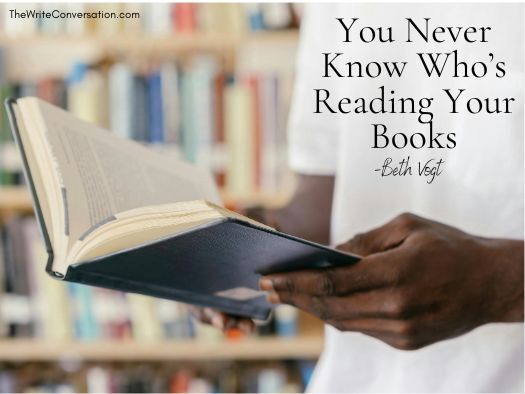
by Beth K. Vogt @BethVogt
You never know who’s reading your books.
I texted that message to a group of writer-friends earlier this week. Here’s the reason why:
My husband Rob called me mid-morning this past Monday. That was odd because Rob’s a family physician and he’s usually too busy seeing patients to stop and chat with me.
The reason for his call? Rob had just seen a patient who’d happened to read my Thatcher Sisters Series. She asked Rob to tell me that she enjoyed the three novels, explaining how she’s the youngest of three sisters and she liked my characterization of the sisters’ relationships. She also told Rob she liked the faith element because too often novels don’t have any spiritual message.
I have no idea who this reader is because Rob never reveals patient information to me. This unknown woman’s encouragement made my day, my week, and likely the rest of June for me.
You might be thinking, “Oh, come on, Beth, it’s just some nice feedback.”
Yep, it is.
But let me share some perspective on how powerful her feedback is for me—and for you too.
The Thatcher Sisters Series was published by Tyndale and is comprised of three women’s fiction novels: Things I Never Told You , which released in 2018, Moments We Forget , which released in 2019, and The Best We’ve Ever Been , which released in 2020.
In other words, it’s been a while since these books hit the shelves. As time passes, it’s all too easy to think my books are forgotten. Maybe you feel the same way about some of your published books.
But you never know who’s reading your books—even the ones you published years ago. You never know if your book is still on someone’s To Be Read (TBR) pile. Or if your book is being handed off to someone’s friend as a recommended read. Or if your book is being checked out of the library. Or if—yes, even this!—your book is being found at a garage sale.
I pray over every book I write. One specific prayer I always pray over a finished manuscript is that God will use my novel to somehow draw the reader closer to Jesus, wherever they are on their faith journey.
Monday’s phone call was a sweet moment of encouragement, yes. But it was also a reminder that my prayer has no expiration date on it. God can still use my books long after they’ve been released into the world … into the hands of my readers.
The same is true for you, my friends.
TWEETABLEYou Never Know Who's Reading Your Books from @BethVogt on @EdieMelson (Click to Tweet)
 Beth K. Vogt believes God’s best often waits behind the doors marked “Never.” She’s authored 15 novels and novellas, both contemporary romance and women’s fiction. Beth is a Christy Award winner, an ACFW Carol Award winner, and a RITA® finalist. Her newest contemporary romance novel, Dedicated to the One I Love, released June 20, 2023. Her novel Things I Never Told You, book one in her Thatcher Sisters Series by Tyndale House Publishers, won the 2019 AWSA Golden Scroll Award for Contemporary Novel of the Year. An established magazine writer and former editor of the leadership magazine for MOPS International, Beth blogs for Learn How to Write a Novel and The Write Conversation and also enjoys speaking to writers group and mentoring other writers. She lives in Colorado with her husband Rob, who has adjusted to discussing the lives of imaginary people. Connect with Beth at BETHVOGT.COM.
Beth K. Vogt believes God’s best often waits behind the doors marked “Never.” She’s authored 15 novels and novellas, both contemporary romance and women’s fiction. Beth is a Christy Award winner, an ACFW Carol Award winner, and a RITA® finalist. Her newest contemporary romance novel, Dedicated to the One I Love, released June 20, 2023. Her novel Things I Never Told You, book one in her Thatcher Sisters Series by Tyndale House Publishers, won the 2019 AWSA Golden Scroll Award for Contemporary Novel of the Year. An established magazine writer and former editor of the leadership magazine for MOPS International, Beth blogs for Learn How to Write a Novel and The Write Conversation and also enjoys speaking to writers group and mentoring other writers. She lives in Colorado with her husband Rob, who has adjusted to discussing the lives of imaginary people. Connect with Beth at BETHVOGT.COM.
Published on June 13, 2025 22:00
June 12, 2025
Write to Give, Write to Live
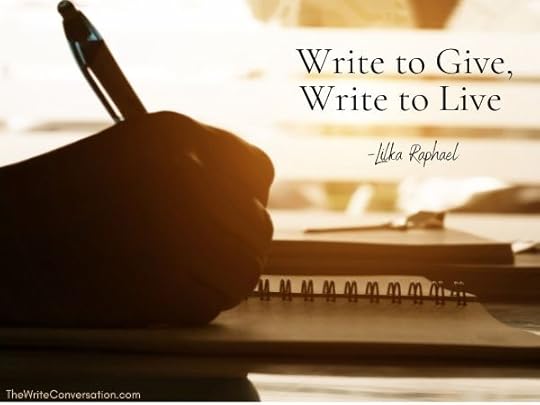
by Lilka Raphael @Lilka_Raphael
If you're going to live, leave a legacy. Make a mark on the world that can't be erasedMaya Angelou
As writers, we often explain what we write. However, we don’t always consider why we write. Some authors are diligent with purpose, their reasons are clear. Yet there have been times that I wasn’t quite sure why I was writing. The only certainty was the compulsion to write.
If you don’t know why you hover over a keyboard or explore prose in longhand, that’s okay. What can be an arduous, solitary process can prod us to question why we do this. The return on the time invested to write and rewrite may at times seem meager at best. However, the call to write is not easily denied.
Whatever we write should stir the talents we are gifted with and benefit others. I’ve written to inspire people and lead them to Christ. My writing has also served as a catharsis as I raised a special needs child and processed grief. Sometimes our why isn’t evident until many years later. The words we keep hidden and closest to us can years later provide empathy and solace to those who need them most. The phrases we readily dismissed as rubbish can eventually change the trajectory of a heart or mind.
The humorist serves as high a calling as an educator. The author that provides a glimpse into foreign realms grants rest and renewal to anxious minds. Needs vary throughout life and writers serve them all. Instead of focusing on publication, a renewed emphasis on purpose can fortify us to press forward even when doubt lingers. Imperfect execution that fulfills a need will eventually find an audience.
Like prayer, authentic writing eclipses eloquence. Some of the greatest authors who lived never imagined the millions of people they would encourage, comfort, and transform by their musings. The words of poets, comedians, pastors, and novelists offered critical reflections at just the right time. Charles Spurgeon, Robert Frost, Langston Hughes, Harper Lee, Charles Schultz, and Toni Morrison are just a few who transformed society, religion, and pop culture. Their legacies transcended their lives.
Whatever our why, words matter. Words are so powerful that the Lord spoke the world into existence. Words contain life and death. Long after we’re gone, our words can affect generations yet to come. Or lead one soul to Christ. God used four men to write the Gospels. Their words change lives and ours can too.
We have different gifts, according to the grace given to each of us. If your gift is prophesying, then prophesy in accordance with your faith; if it is serving, then serve; if it is teaching, then teach; if it is to encourage, then give encouragement; if it is giving, then give generously; if it is to lead do it diligently; if it is to show mercy, do it cheerfully. Romans 12:6-8 NKJV
TWEETABLEWrite to Give, Write to Live from @Lilka_Raphael on @EdieMelson (Click to Tweet)
 A Florida native, Lilka Finley Raphael has been a licensed pharmacist for over thirty years. Her passions for writing, gardening, and photography prompted her to share her experiences and life lessons on her blogs B Is for Blessed and God, autism, & me. You can learn more about her at lilkaraphael.com
A Florida native, Lilka Finley Raphael has been a licensed pharmacist for over thirty years. Her passions for writing, gardening, and photography prompted her to share her experiences and life lessons on her blogs B Is for Blessed and God, autism, & me. You can learn more about her at lilkaraphael.comLilka’s greatest achievements are her two adult sons who have flown the nest. Happily married for thirty-two years, she lives east of Atlanta with her husband, Rod. They now share their home with two German Shepherds—Holly and Ivy—and one naughty kitty, Moxie.
Published on June 12, 2025 22:00
June 11, 2025
10 Ways Your Writing Can Improve by Reading to Kids
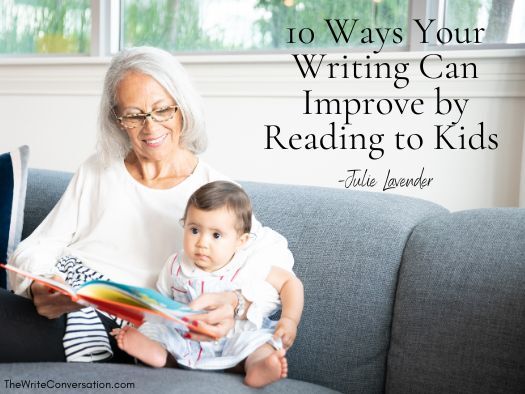
by Julie Lavender @JLavenderWrites
This summer, our kindergarten-graduated grandson will join us for a week in June and a week in July, between camps and his other grandparents, to help out our kiddos who both work full-time jobs. My writing may take a backseat during those weeks, but instead, I’ll ramp up my reading time. Kid lit reading, that is.
I loved reading to my children when they were little. At that time, I didn’t ponder the benefits of reading aloud to them—I just knew how much I enjoyed snuggling with a picture book in my hands and littles in my lap.
I hope you’ll use some of the extra, non-school hours of summertime to treat your kids or grandkids to lots and lots of picture books.
Here’s a few of the benefits of reading to kids to take to heart, whether you’re a children’s author or adult author. Many of these I found while researching the HeadStart webpage or the Child Mind Institute.
Improve Your Writing When You Read to Kids1. First and foremost, child experts believe reading to children encourages and enhances language development. Little ones, even babies, learn to associate the spoken word with pictures on a page, and then eventually the words on the page. Reading to a child lays the groundwork for language use and comprehension and literacy.
According to ChildMind.org, parents who read to their children expose their kids to at least 290,000 more words by the time they start kindergarten than kids who are not read to regularly.
2. Reading enhances brain development. Headstart.gov states that babies’ brains make preparations to speak long before they say their first words. Children need a wealth of language to encourage that brain development.3. Reading to children strengthens the bond between the parent and child. Especially in today’s climate, reading with a child removes them from the possibility of screen time and gets them to connect with you as the parent and spend quality time together. 4. Book time shared together gives parents and children opportunities for back and forth interactions, from gestures and gibberish with little ones pre-language and actual verbal question and answer time or conversations about the books with older ones.5. Reading a host of books to children about kids in other places or in homes with different parenting styles or characters who are different boosts empathy and understanding in the child being read to. Yes, reading to children is vitally important to their academic and emotional growth and success.
But are their benefits to the reader who is also a writer? I’m adding a few of my own ideas about how reading aloud to children stimulates the writer’s brain, too.
6. Fiction writers who read picture books to kids are exposed to short pieces with an arc, characters, plot, setting, theme, and dialogue. Readers make better writers, and the opportunity to ingest these characteristics of a book boosts creativity for the next writing opportunity. 7. Non-fiction writers who read fiction get the same benefits as above, because some of the best non-fiction pieces take advantage of those same fiction techniques listed above. 8. Fiction writers and non-fiction writers who read non-fiction books to kids gain information that’s fun and educational and just might spark some creative ideas and whet the appetite for new projects.9. Reading aloud to kids can break a spell of writers’ block. Sometimes when we’re not thinking about a project and participate in an unrelated creative activity, our brain rests and rejuvenates and sends us back to the project with fresh ideas and enthusiasm.10. It’s fun! And writers like to have fun!!
Spend time reading with little ones this summer, lots and lots of time. I’m convinced blessings will abound – for you the reader, for the ones being read to, and for your current work-in-progress.
Join the conversation. What’s your favorite children’s book to read to little ones?
TWEETABLE10 Ways Your Writing Can Improve by Reading to Kids from @JLavenderWrites on @EdieMelson (Click to Tweet)
 Julie Lavender has too many favorite picture books to choose just one. Her long-time dream of writing a children’s book came true last fall with the release of A Gingerbread House. She had a ton of fun promoting it during the holidays and would love for you to order a copy in preparation for this year’s holiday season. Or, celebrate Christmas in July and read it to a favorite little one then! She’s also the author of books for adults that include a mom’s devotional and a book about raising sons.
Julie Lavender has too many favorite picture books to choose just one. Her long-time dream of writing a children’s book came true last fall with the release of A Gingerbread House. She had a ton of fun promoting it during the holidays and would love for you to order a copy in preparation for this year’s holiday season. Or, celebrate Christmas in July and read it to a favorite little one then! She’s also the author of books for adults that include a mom’s devotional and a book about raising sons.
Published on June 11, 2025 22:00
June 10, 2025
Use These Foundational Truths to Encourage Other Writers and Ourselves
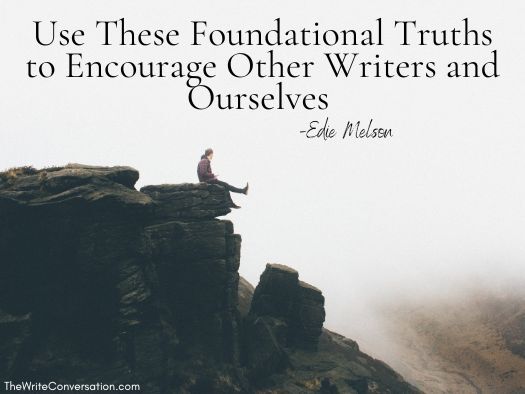
by Edie Melson @EdieMelson
Being a writer is tough. We create from the heart and then submit our dreams to others for their opinions and approval. Some days it seems everywhere we turn we see only discouraging words.
Beyond that, writing is often a solitary pursuit. Truthfully, it’s the successful writers who know better than to try to go it alone. Writing in a vacuum is not a good idea—for a lot of reasons. It’s easy to lose perspective and either believe what you’re writing is perfect, or worse, that it’s junk. Having others who share the same struggles make us stronger.Not to mention the fact that they can talk us down when we’re standing on a writing ledge. Writers can encourage Writers like no one else can. That’s what I want to share today.
10 Foundational Truths to Encourage Us When the Writing Life Gets Hard
1. Success has nothing to do with perfection. So often we try to make our writing perfect. It’s fine to shoot for excellence, but perfect is never going to happen. Quit beating yourself up for not reaching it.
2. Every writer’s journey is different. Writers are masters at comparison. We try to judge our own worth by what others have or have not accomplished. We need to look within, not without when measuring our success.
3. Quit being so hard on yourself. We are our own worst critics. We allow the negative voices in our heads free reign. It’s time to replace those harsh words with kind ones.
4. Courage isn’t the absence of fear. All writers struggle with fear—fear of failure, fear of not being good enough, fear of success. The key is to fight. Don’t give up, don’t give in.
5. Nothing lasts forever. This is even true for writers. There are good days, bad days, great days, and days when we want to give up. Remember that the ups and downs will happen, and this too shall pass.
6. It takes as long as it takes. So often we want success to be a part of a formula. The truth is, like I said on #2, every writer’s journey is different.
7. Sometimes you have to write through the junk to get to the jewels. We all want our writing path to be a continuous, unbroken line of improvement. The truth is far from that. There will be days, weeks, and even months where it’s more of a two steps forward and three steps back.
8. Failure is an option. More often than not it’s also the shortest path to success. Learn from your mistakes, isn’t just a cliché, it’s a truth. Don’t beat yourself up when you fail, learn what you can and keep moving forward.
9. Writing is a journey, not a destination. When we get started on the writing road, we mistake milestones for destinations. It’s easy to think there’ll be a time when we’ve arrived. Truthfully, that never happens. Each achievement is just a gateway to the next part of our writing journey.
10. Nobody writes a perfect first draft. The genius of writing comes in the rewriting. Don’t let a mediocre start keep you from finishing strong.
These are some of the things that my writing buddies have said to me when I was standing on a metaphorical ledge, about to jump. I’d love to know what you’d add to the list.
Don’t forget to join the conversation!Blessings,Edie
TWEETABLEUse These Foundational Truths to Encourage Other Writers and Ourselves from @EdieMelson (Click to Tweet)
 Edie Melson is a woman of faith with ink-stained fingers observing life through the lens of her camera. She’s a writer who feels lost without her camera and a card-carrying introvert who loves to encourage an audience. She also embraces the ultimate contradiction of being an organized creative. As a popular speaker, she’s encouraged and challenged audiences across the country and around the world. Her numerous books, including the award-winning Soul Care series reflect her passion to help others develop the strength of their God-given gifts and apply them to their lives.
Edie Melson is a woman of faith with ink-stained fingers observing life through the lens of her camera. She’s a writer who feels lost without her camera and a card-carrying introvert who loves to encourage an audience. She also embraces the ultimate contradiction of being an organized creative. As a popular speaker, she’s encouraged and challenged audiences across the country and around the world. Her numerous books, including the award-winning Soul Care series reflect her passion to help others develop the strength of their God-given gifts and apply them to their lives.She and husband Kirk have been married 43+ years, and live near their three sons and three grandchildren in the foothills of the Blue Ridge Mountains. Edie and Kirk can often be found with their big black dog hiking—Edie hanging off ledges for the best camera angle and Kirk patiently carrying her tripod. Connect with her on her website, WWW.EDIEMELSON.COM and through social media.
Published on June 10, 2025 22:00
June 9, 2025
Necessary Items that Make the Novel You're Writing Work
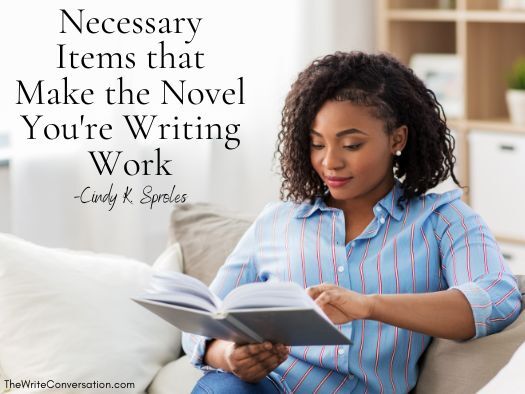
by Cindy K. Sproles @CindyDevoted
Writing a novel isn’t easy. However, there is an abundance of new writers who have completed their first one. I say kudos to them. These new writers have stuck to the time constraints of writing. They’ve fought through getting every word on the page until they can type, The End on a finished work. What an accomplishment. The next step in the new writer’s eye is to pitch this work to a publisher or agent.
STOP! Do not pass go. There are steps you may have missed. As I said earlier, writing a novel isn’t easy, and just putting the words on the page doesn’t a novel make. New writers often assume that once the work is written, it’s ready.
6 Essential Details that Must be Included to Make a Successful Novel
1. A winning idea: Everyone assumes their story is the berries, and it may be in their imagination, but it has to be special. Your story idea must be strong enough to warrant 75,000 to 100,00 words. Through all those words, your story must be interesting enough to hold the reader from beginning to end. Your idea should be filled with conflict. Conflict is the tool that pushes the plot (story) forward. Ask yourself the question, “Is this a story I would read?” It should excite you every day. This is what makes you want to write it. If your story doesn’t excite you, why would it excite me?
2. Decide what kind of a writer you are: Are you a Pantser or an Outliner? You should understand the type of writer you are so that you can form your story properly. A pantser allows the story to unfold as they write, while an outliner outlines every point in the story. There are advantages to both styles but understanding your style will help you best write who you are on the page. I’m a pantser. I let the story guide me, and when opportunities for a sudden turn in the plot can happen, I get to choose the path. Having said that, it is advantageous for me to chart my twists and turns so that I can see my story arc and be sure the arc doesn’t become a flat line. Every writer needs to grasp some sort of story structure so that work remains fluid and well-formed. Whether it’s through an outline or by journaling twists and turns as they happen, a writer must have a structure that they follow to shape a good novel.
3. Create a protagonist that wakes you up in the middle of the night: We want our protagonist/hero to be amazing. I say amazing doesn’t cut it. You want your protagonist/hero to be memorable. They become amazing when they are so developed that those scutters wake you up from a deep sleep. Memorable is what you want. Unforgettable. In order to achieve this, it’s important that your protagonist has flaws. If he/she is perfect, then we have no reason to follow their plight. He/she needs to experience a life change of some sort. They need to have flaws that hinder and tempt them—things that make them real to the reader. Cinderella would be boring, flitting around the forest and singing all day unless she had a flaw that put her in danger. Her flaw is curiosity. If she’d only had left the apple alone. (I wonder if she was based on Eve?) A good protagonist will occasionally make a bad decision and, as a result, pay a price. What makes a hero a hero is their ability to overcome their personal hardships and flaws, to learn from those mistakes, and to apply their life lessons.
4. Oh yeah, you’ll need an antagonist (bad guy) who is equally as impactful: We’ll need to see the reasons your bad guy is bad. He can’t just be bad. Your reader needs to understand why your antagonist is bad. This makes him a worthy and memorable foe.
In my first novel, Mercy’s Rain, I made the pastor so bad, so horrible, that my reader could have easily said, “Forget this,” and laid down the book. Instead, I gave the reader a breath and allowed them one short glance into the pastor’s past, one incident of obviously many that made him the way he was. It didn’t justify his atrocities, but for an instant, the reader saw why he was the way he was, and this allowed them to tolerate him for the duration of the novel. They didn’t have to like him or feel sorry for him, but they saw a glimpse of what made him bad. Hence, keeping your reader in the dark about everything is not good. They need appropriate information to keep them reading.
5. Plot: Yes, you must have a plot. Lots of talking, eating, and sitting in a restaurant do not make a plot. As a writing coach, this is where I see new writers flounder. When I ask the question, “What is the point of this story?” and the writer can’t tell me. This tells me two things: 1) the writer has a weak story idea, and 2) they don’t know what the journey of this story is. If the writer doesn’t have a clear snapshot of what their story is truly about, then they cannot put together a successful novel. Know your story. Flesh out the whys and how comes. Without them, you have no story.
I’ve had first-time mystery writers tell me they don’t want the reader to know who the killer is, and they fail to introduce us to all the characters in the story. It’s important we know ALL the characters and even their motives. That information doesn’t give away the killer, but it gives us enough information to begin to formulate an answer. Just watch an Agatha Christie movie. Of course, we have to continue to read and put together the clues to discover which character is the culprit. Your readers must have certain information that helps them follow the story.
6. Story arc: I frequently see writers who have pages and pages of dialogue but not an ounce of story. You cannot have a novel without a plot, and just as each character needs a character arc, your story also needs that arc—a beginning, a reason to step out on a journey, holes that trip up the protagonist and force them to work around to reach their ultimate goal, and a resolution. We must have a story, aka. Beginning, middle, and end. Think of your daily life. You have goals and things that must be accomplished in order to reach the point of success. The same is true in a novel. Beautiful dialogue and description don’t tell us a story—a goal, a path to the goal, obstacles that stand in the way of the goal, and attaining that goal, as well as seeing a change in our protagonist, makes for a satisfying and hopefully memorable novel.
A good rule of thumb is to drop your character into trouble asap. Their efforts to escape the trouble only make matters worse until it looks …well…hopeless. That’s when your protagonist finally figures out what is necessary to succeed and follows it to success. A story arc is just that, an arch drawn on paper. Think St. Louis, MO, and the arch to get a physical picture in your head. Along that arch are the plot points that build to the high point or the moment of hopelessness, and then we work our way down to a satisfactory ending.
If you’re a new writer, take the time to learn the basics of writing a novel or a non-fiction piece. Writing the piece is just the beginning. Making sure your work hits all the marks requires you to study the steps. If you’re a seasoned author, backtrack and recheck your work. It always pays to look back. Learning these steps will help you make your work the best it can be.
TWEETABLENecessary Items that Make the Novel You're Writing Work from @CindyDevoted on @EdieMelson (Click to Tweet)
 Cindy K. Sproles is an author, speaker, and conference teacher. Having served for a number of years as a managing editor for Lighthouse Publishing of the Carolinas and Ironstream Media, Cindy now works as a mentor, coach, and freelance editor. She is the co-founder of Writing Right Author Mentoring Services with Lori Marett and she is the director of the Asheville Christian Writers Conference. Cindy is also the co-founder of Christian Devotions Ministries and WWW.CHRISTIANDEVOTIONS.US, as well as WWW.INSPIREAFIRE.COM. Her devotions are in newspapers and magazines nationwide, and her novels have become award-winning best-selling works. She is a popular speaker at conferences and a natural encourager. Cindy is a mountain girl, born and raised in the Appalachian mountains, where she and her husband still reside. She has raised four sons and now resorts to raising chickens where the pecking order is easier to manage. You can visit Cindy at WWW.CINDYSPROLES.COM or www.wramsforwriters.com.
Cindy K. Sproles is an author, speaker, and conference teacher. Having served for a number of years as a managing editor for Lighthouse Publishing of the Carolinas and Ironstream Media, Cindy now works as a mentor, coach, and freelance editor. She is the co-founder of Writing Right Author Mentoring Services with Lori Marett and she is the director of the Asheville Christian Writers Conference. Cindy is also the co-founder of Christian Devotions Ministries and WWW.CHRISTIANDEVOTIONS.US, as well as WWW.INSPIREAFIRE.COM. Her devotions are in newspapers and magazines nationwide, and her novels have become award-winning best-selling works. She is a popular speaker at conferences and a natural encourager. Cindy is a mountain girl, born and raised in the Appalachian mountains, where she and her husband still reside. She has raised four sons and now resorts to raising chickens where the pecking order is easier to manage. You can visit Cindy at WWW.CINDYSPROLES.COM or www.wramsforwriters.com.
Published on June 09, 2025 22:00
June 8, 2025
Three Reasons Every Writer Should Work with a Writing Coach

by Larry J. Leech II @LarryJLeechII
Ever sat and stared at a blank Word doc or one with words that seemed in the wrong order and wished you could get help? If so, you are not alone.
While writing can be an exciting experience, it also can be lonely and full of pitfalls if one tries to figure it out on their own. Yes, we can find instructional videos on YouTube and read countless blogs, articles, and books about writing. But nothing compares to the personal interaction with a industry veteran who is willing to help another writer. That’s why coaches have become popular during the last decade.
Three reasons why a writer should hire a coach:Encouragement: Even though the goal of a coach is to make you and your writing better, authors love—and need—positive feedback. A good coach will include positive feedback in each review. Guidance: A coach can brainstorm ideas and even the next handful of chapters. This will keep you on the right path with your story or message.Accountability: Meeting on a regular basis will keep you moving forward. It’s easy to write only when we’re motivated, but being accountable to another will push you forward quicker to finish your project.
How a writing coach can help you:
For fiction and memoir, which I included because memoir is a blend of journalism (the facts of who, what, when, where) and fiction (all the techniques used for the reader to ‘live’ the story).
Dialogue: Ensure the dialogue is believable. In contemporary fiction, all characters must sound like their age group (a female teenager shouldn’t speak like a sixty-something male). Likewise, in historical fiction, characters cannot use contemporary language. In most historical fiction, the dialogue needs to match the language of the era. Also, a coach can help with stilted dialogue, tone before dialogue (very important so the dialogue is read in the intended tone), and dialogue tags, to name a few.
Setting: Help anchor the characters in the scene. Each character needs anchored so they don’t feel like they float around in space or appear out of thin air.
Description: Guarantee you have the right amount. Too much description can bog down the reader with unnecessary details. Too little can keep them from ‘seeing’ the person or scene.
Character arc / development: Show you techniques to strengthen your characters into memorable ‘people’ your readers won’t soon forget. Think Jack and Rose from Titanic.
Story flow, pacing: Confirm that the story flows at the right pace so the readers doesn’t get bored or worn out. This is where “great writing is based not on what is included, but rather what is left out.” Unnecessary details or information may cause the reader to lose interest.
Beautiful beginning: Mickey Rooney said years ago, “The beginning of your book sells that book. The ending sells your next book.” This could be applied to the beginning of each scene or chapter. Some coaches will spend a session or two on just the beginnings of scenes or chapters, as well as the ending of each.
Fantastic finish: Does each scene or chapter end in a manner that will make the reader want to keep reading. If not, the reader may have found a convenient stopping point, something novelists never want to happen.
Nonfiction
Story: Will make sure each chapter starts with a short—sometimes personal—story that hooks the reader and draws them into the teaching point.
Point: Will help you present a clear and easy-to-understand point with language that is familiar to the reader. This is a section in which the coach will flag ‘industry’ language (e.g., Christinese).
Illustration: Will ensure the illustration is clear and concise. An unclear illustration will only confuse the reader.
Takeaway: Will guarantee the chapter has a strong takeaway that includes a call-to-action or reflective questions.
How does one find a coach?
Well, let me count the ways.References / recommendationsAttend a writing conference
In either situation, I highly recommend you ‘interview’ the perspective coach. Working with a coach can be a great experience. You need to know you can trust your coach with your message or story.
A few questions to ask: What is their experience? What is their process (e.g., review followed by a Zoom call or just email correspondence)? How often will they meet? Are they willing to brainstorm? Do their clients win awards? Does the coach have repeat customers? Do they cover everything mentioned above? How often do they invoice?
There are other ways to find a coach, but I don’t advocate doing so. I mentioned above the importance of trusting your coach. Finding a coach through internet searches or websites that advertise these services can lead to an unfortunate or frustrating experience.
What is the cost?
Because most coaches customize their coaching to the needs of the author, cost can vary from coach to coach and from project to project. Obviously, a coach with 20 years of experience and whose clients have won more than 100 awards will cost more. However, coaches who have a heart to help authors will often work within a writer’s budget.
So, if you’re worn out trying to move forward alone, consider hiring a coach. Getting published is a group effort, and finding the right coach will help you enjoy the journey to publication.
TWEEETABLEThree Reasons Every Writer Should Work with a Writing Coach from @LarryJLeachII on @EdieMelson (Click to Tweet)
 Usually with a hot beverage nearby, Larry J. Leech II spends his days working with words—as a writing coach of award-winning authors, as well as Acquisitions Editor and Master Book Coach for Illumify Media. More than forty years ago, Larry started his career as a sportswriter in southwestern Pennsylvania where he covered prep sports, college sports, and the Pittsburgh Pirates and Steelers. In 2004, after 2,300 published articles, Larry shifted to book publishing. Since that time, he has ghostwritten thirty books, edited more than 450 manuscripts, and coached hundreds of authors through the writing and publication process. For nearly two decades Larry has taught at numerous general market and inspirational conferences nationwide. When he has a minute, Larry likes to hang out on Facebook and Instagram. You can also find out more about him on his website: larryleech.com.
Usually with a hot beverage nearby, Larry J. Leech II spends his days working with words—as a writing coach of award-winning authors, as well as Acquisitions Editor and Master Book Coach for Illumify Media. More than forty years ago, Larry started his career as a sportswriter in southwestern Pennsylvania where he covered prep sports, college sports, and the Pittsburgh Pirates and Steelers. In 2004, after 2,300 published articles, Larry shifted to book publishing. Since that time, he has ghostwritten thirty books, edited more than 450 manuscripts, and coached hundreds of authors through the writing and publication process. For nearly two decades Larry has taught at numerous general market and inspirational conferences nationwide. When he has a minute, Larry likes to hang out on Facebook and Instagram. You can also find out more about him on his website: larryleech.com.
Published on June 08, 2025 22:00
June 7, 2025
4 Things to Do When the Words Don’t Come
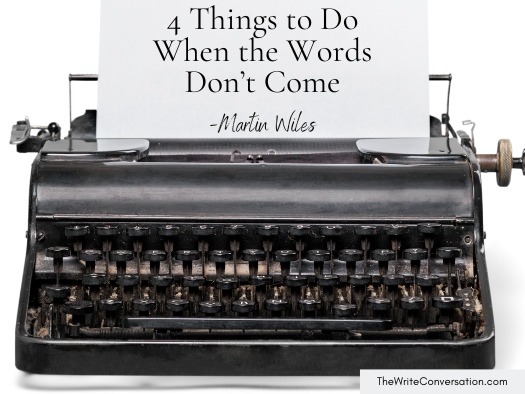
by Martin Wiles @LinesFromGod
“These are the last that I have. I have not had any inspiration for a couple of months, so I don’t know if there will ever be any more. I hope so, but who knows?” I, too, had experienced those times when the words don’t come.
My heart broke as I read my friend’s words. She and I had written for the same website for a decade. But now, the managing editor had decided to retire. He would no longer take contributions. I managed two other websites and had a personal one, so I asked my friend to contribute to all three. Excitedly, she agreed.
Months later, however, I received the above response when I emailed her, asking for more devotions.
I responded with the only words I could muster: “I think we writers all move through those periods. I will pray for God to inspire you with new material.”
In my sixteen years of writing, I have known more than one writer who has disappeared from the grid. I’ve known popular writers whom I suddenly stopped seeing at writers’ conferences. When I questioned a mutual friend about their absence, she offered various stories about why they were no longer writing or speaking at conferences.
I felt their pain. I had been tempted on more than one occasion to give up. I felt like my friend who thought she had nothing left to offer. Some days, the muse wouldn’t deliver the words I longed to write. I thought I had nothing more to give, as if I were repeating what I had already said a thousand times. And during the summer, or the holidays, when my blog numbers crashed, I felt even more like surrendering the pen. I remembered when I could whip out a devotion or article in no time flat.
Then, I thought of Elijah and how he must have felt. Although perhaps not in written form, he had given God’s word. And what did it get him? Rejection and a death threat. So, he ran … and ran … and ran. Until he couldn’t run any farther. He finally crashed under the shade of a broom tree and asked God to let him die. He had nothing left to give.
“Then he went on alone into the wilderness, traveling all day. He sat down under a solitary broom tree and prayed that he might die” (1 Kings 19:4 NLT).
Maybe some writers never reach that point, but I imagine most of us do—at least, once. We have no more devotions to write. No more stories to tell. No more characters to develop. No more advice to offer. No matter what we do, the words don’t come.
No one-size-fits-all solution exists, but there are some everyday things we all can do that typically get the writing juices flowing again.
1. Spend time in nature.God has a habit of speaking through his creation when we take time to listen. Sights, smells, and sounds confront us, which, in turn, spark thoughts worth sharing.
2. Secure a notepad.The notepad may be a literal one that requires a pen or pencil or an app on our phones. We tend to forget writing prompts that we don’t immediately record. We especially need something close to our bedside. What comes to us in the night will quite likely leave us in morning’s light.
3. Search for silence.Silence is increasingly challenging to find in our noisy world of gadgets and busyness. But Jesus sought it out, and if he did, we should also. In the quiet, Elijah found his renewed purpose. In silence, we often find the words that won’t come in noisy environments.
4. Speed up.We may not have time to exercise, but we cannot afford not to. A better feeling body leads to a better functioning mind. Many a devotion has come to me while taking my afternoon walk after a challenging day of teaching English and computer to middle schoolers.
When the words don’t come, refuse the temptation to give up. God always has something else he wants you to say.
TWEETABLE4 Things to Do When the Words Don't Come from Martin Wiles (@LinesFromGod) on @EdieMelson (Click to Tweet)
 Martin Wiles lives in Greenwood, SC, and is the founder of Love Lines from God. He is a freelance editor, English teacher, pastor, and author. He serves as Managing Editor for both Christian Devotions and Vinewords.net and is an instructor for the Christian PEN (professional editor’s network). Wiles is a multi-published author. His most recent book, Hurt, Hope and Healing: 52 Devotions That Will Lead to Spiritual Health, is available on Amazon. He and his wife are parents of two and grandparents of seven. He can be contacted at mandmwiles@gmail.com.
Martin Wiles lives in Greenwood, SC, and is the founder of Love Lines from God. He is a freelance editor, English teacher, pastor, and author. He serves as Managing Editor for both Christian Devotions and Vinewords.net and is an instructor for the Christian PEN (professional editor’s network). Wiles is a multi-published author. His most recent book, Hurt, Hope and Healing: 52 Devotions That Will Lead to Spiritual Health, is available on Amazon. He and his wife are parents of two and grandparents of seven. He can be contacted at mandmwiles@gmail.com.
Published on June 07, 2025 22:00
June 6, 2025
10 Reasons to Say Thank You after a Writing Conference
Edie here! I know my guest blogger today needs NO introduction to most of you. Even knowing that, I am super excited for my co-director of the Blue Ridge Mountains Christian Writers Conference to share a blog post today on The Write Conversation. Be sure to give her a warm TWC welcome and hopefully she'll send more posts our way!
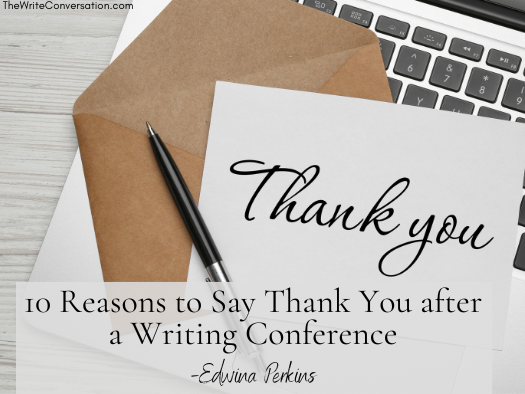
10 Reasons to Say Thank You after a Writing Conferenceby Edwina Perkins @EdwinaPerkins
At a young age, my parents would not allow my brother and me to play with gifts we received until we sent thank you notes. We were quick to write those notes! Because the importance of writing thank you notes was instilled in me, I carried on note writing to our children, but I had to add an additional requirement—the notes needed to be legible.
My final year of high school, I gave each of my teachers a gift before Christmas break. I don’t remember the specific gifts or most of my teachers, but I remember my senior English teacher, Miss Barker. She wrote me a thank you note, expressing appreciation for the gift and included a personal note about me as her student. I have kept that note for over forty years.
While home schooling our four children, I taught various subjects at homeschool co-ops, including creative writing classes and advanced math. I received many notes from students. Some expressed humor, such as, “Thank you, Mrs. Perkins, for helping me not to hate math,” to more heartfelt ones. I saved most of these notes.
Writers have poured into my writing through critique groups, mentors, one-on-one appointments, and conferences. Most often by being a friend and offering support during both challenging and celebratory times. I’m so blessed to have the writing world as family. I love working with writers! I try to write thank you notes to these individuals, although I am not always consistent.
I’ve had the privilege to speak and teach at numerous writing conferences and many times I receive notes of appreciation. Not that I expect them, but I do appreciate the thoughtfulness.
The Importance of Writing Thank You Notes after a Writing Conference1. Thank you notes reveal how much you care. The receiver understands you have spent the time thinking about them and shows your appreciation for how they helped you.2. Personal notes show the recipient they are not receiving a generic letter with just their name changed and encourage deeper connections. 3. Notes make the recipient feel good and can also make you feel good.4. A handwritten note shows you invested your personal time to acknowledge the receiver invested theirs.5. Notes make you stand out and remembered as the writer. 6. Thank you notes have the uniqueness of being long lasting. I mentioned earlier, I treasure the notes I receive.7. Thank you notes reflect the sender's style and personality. Some can even be homemade!8. Writing notes helps the writer to slow down and reflect on what they’re writing and increase the ability to focus and think about the receiver.9. Thank you notes inspire creativity either through choosing the card or composing the message.10. Writing a note by hand adds a personal and meaningful touch, encouraging stronger connections. At the the Blue Ridge Mountains Christian Writers Conference (BRMCWC) below are some of the words of appreciation I received:“As a first-time attendee, it was a delight to instantly be made to feel at home with family!”“Thank you for your part in encouraging and guiding me in my future ministry.”“Thank you for equipping writers to bear this message with courage, clarity, and compassion.”“I am thankful for the time to listen to you, and hear your insight, and perspective.”“Thank you for all you do for young/seasoned writers at BRMCWC. You make a difference.”
Notes of appreciation cause me to smile and reflect. I can easily remember the issues that occurred at the conference behind the scenes. As part of the leadership team, we see it all! But a word of thanks reminds me God is still changes the lives of writers.
TWEETABLE10 Reasons to Say Thank You after a Writing Conference from @EdwinaPerkins on @EdieMelson (Click to Tweet)
 Edwina Perkins is the assistant director of Blue Ridge Mountains Christian Writers Conference. She is also the coordinator for Mentoring Moments and the manager for Sensitivity Between the Lines, both with Blue Ridge Mountains Christian Writers Conference. Edwina is the managing editor for Harambee Press, an imprint of End Game Press. As a longtime member of Word Weavers International, she now serves as a member of the advisory board.
Edwina Perkins is the assistant director of Blue Ridge Mountains Christian Writers Conference. She is also the coordinator for Mentoring Moments and the manager for Sensitivity Between the Lines, both with Blue Ridge Mountains Christian Writers Conference. Edwina is the managing editor for Harambee Press, an imprint of End Game Press. As a longtime member of Word Weavers International, she now serves as a member of the advisory board.
Edwina is an award-winning writer, experienced teacher, speaker, freelance editor, and a sensitivity/authenticity consultant and has been published in numerous publications. One of her passions is to address the need for sensitivity and diversity in the publishing industry. She is also known as Nona to two precious grandchildren.

10 Reasons to Say Thank You after a Writing Conferenceby Edwina Perkins @EdwinaPerkins
At a young age, my parents would not allow my brother and me to play with gifts we received until we sent thank you notes. We were quick to write those notes! Because the importance of writing thank you notes was instilled in me, I carried on note writing to our children, but I had to add an additional requirement—the notes needed to be legible.
My final year of high school, I gave each of my teachers a gift before Christmas break. I don’t remember the specific gifts or most of my teachers, but I remember my senior English teacher, Miss Barker. She wrote me a thank you note, expressing appreciation for the gift and included a personal note about me as her student. I have kept that note for over forty years.
While home schooling our four children, I taught various subjects at homeschool co-ops, including creative writing classes and advanced math. I received many notes from students. Some expressed humor, such as, “Thank you, Mrs. Perkins, for helping me not to hate math,” to more heartfelt ones. I saved most of these notes.
Writers have poured into my writing through critique groups, mentors, one-on-one appointments, and conferences. Most often by being a friend and offering support during both challenging and celebratory times. I’m so blessed to have the writing world as family. I love working with writers! I try to write thank you notes to these individuals, although I am not always consistent.
I’ve had the privilege to speak and teach at numerous writing conferences and many times I receive notes of appreciation. Not that I expect them, but I do appreciate the thoughtfulness.
The Importance of Writing Thank You Notes after a Writing Conference1. Thank you notes reveal how much you care. The receiver understands you have spent the time thinking about them and shows your appreciation for how they helped you.2. Personal notes show the recipient they are not receiving a generic letter with just their name changed and encourage deeper connections. 3. Notes make the recipient feel good and can also make you feel good.4. A handwritten note shows you invested your personal time to acknowledge the receiver invested theirs.5. Notes make you stand out and remembered as the writer. 6. Thank you notes have the uniqueness of being long lasting. I mentioned earlier, I treasure the notes I receive.7. Thank you notes reflect the sender's style and personality. Some can even be homemade!8. Writing notes helps the writer to slow down and reflect on what they’re writing and increase the ability to focus and think about the receiver.9. Thank you notes inspire creativity either through choosing the card or composing the message.10. Writing a note by hand adds a personal and meaningful touch, encouraging stronger connections. At the the Blue Ridge Mountains Christian Writers Conference (BRMCWC) below are some of the words of appreciation I received:“As a first-time attendee, it was a delight to instantly be made to feel at home with family!”“Thank you for your part in encouraging and guiding me in my future ministry.”“Thank you for equipping writers to bear this message with courage, clarity, and compassion.”“I am thankful for the time to listen to you, and hear your insight, and perspective.”“Thank you for all you do for young/seasoned writers at BRMCWC. You make a difference.”
Notes of appreciation cause me to smile and reflect. I can easily remember the issues that occurred at the conference behind the scenes. As part of the leadership team, we see it all! But a word of thanks reminds me God is still changes the lives of writers.
TWEETABLE10 Reasons to Say Thank You after a Writing Conference from @EdwinaPerkins on @EdieMelson (Click to Tweet)
 Edwina Perkins is the assistant director of Blue Ridge Mountains Christian Writers Conference. She is also the coordinator for Mentoring Moments and the manager for Sensitivity Between the Lines, both with Blue Ridge Mountains Christian Writers Conference. Edwina is the managing editor for Harambee Press, an imprint of End Game Press. As a longtime member of Word Weavers International, she now serves as a member of the advisory board.
Edwina Perkins is the assistant director of Blue Ridge Mountains Christian Writers Conference. She is also the coordinator for Mentoring Moments and the manager for Sensitivity Between the Lines, both with Blue Ridge Mountains Christian Writers Conference. Edwina is the managing editor for Harambee Press, an imprint of End Game Press. As a longtime member of Word Weavers International, she now serves as a member of the advisory board.Edwina is an award-winning writer, experienced teacher, speaker, freelance editor, and a sensitivity/authenticity consultant and has been published in numerous publications. One of her passions is to address the need for sensitivity and diversity in the publishing industry. She is also known as Nona to two precious grandchildren.
Published on June 06, 2025 22:00
June 5, 2025
How Do I Deliver My Self-Published Book to a Reader?
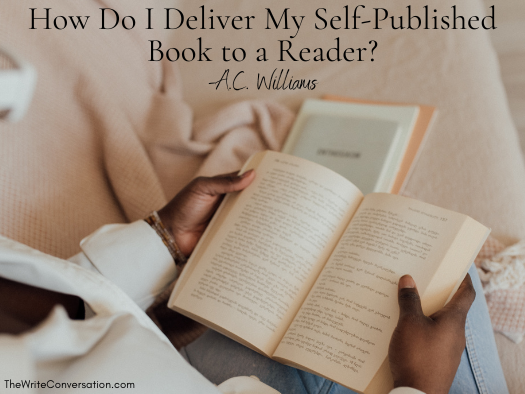
by A.C. Williams @ACW_Author
Once you get your novel ready to publish, how do you get it into the hands of your readers? How do you get your book onto bookstore shelves? Do you pay someone to do it for you? Do you do it yourself?
Self-publishing presents a tremendous opportunity for authors, but it requires you to make major decisions at every milestone of the publishing journey. Not the least of which is your Distribution Plan.
So far in this series on self-publishing, we’ve talked about setting your goals, understanding your legal rights as a self-published author, and ISBNs. This month, we’re going to focus on distribution: how you get your manuscript into the hands of your readers.
The answer to this question will vary enormously depending on your goals, which is why it’s so important to set your goals first.
Obviously, this little blog post isn’t sufficient to detail every publishing platform in the industry. We’re only going to hit a few of them, but most of the processes in working with them are the same regardless which one you choose.
Let’s start with the basics, though. What is a self-publishing platform?
A self-publishing platform is a tool an author can use to publish, print, and distribute their novels through various distribution channels. The most popular platforms are ones like Amazon Kindle Direct Publishing (Amazon KDP), IngramSpark, BookBaby, Smashwords, and Draft2Digital, among many many others.
How do you choose?
Well, that depends on your goals as an author. Most every self-publishing platform distributes everywhere, but not all of them provide a solution ideal for every author.
Do you want your book in libraries? Do you want your book in bookstores? Do you want your book in hardback, paperback, ebook, audiobook formats? Do you want to sell your books at in-person events? Do you want to sell your book through your own website? Are you planning to order a thousand copies of your book?
Choosing a self-publishing platform will depend on how you answer those questions.
If you just want to distribute your book on Amazon, the easiest route is to publish through Amazon KDP. Generally speaking, publishing through KDP is a simple, straightforward process that features tons of documentation, instructions, and even helpful templates.
Through Amazon KDP, you can publish ebooks, paperback books, hardback books (without a dust jacket), and audiobooks (through their partnership with ACX). They offer a variety of trim sizes, different kinds of interior options, and several other personalization options.
If you price your ebook between $2.99 and $9.99, you are eligible for a 70% royalty. If your price is below $2.99 or above $9.99, the royalty drops to 35%. For paperbacks, the royalty is usually 60%. (Note: Those percentages are for sales in the United States only.)
Additionally, if you elect to ONLY distribute your book on Amazon, you can enroll it in Amazon KDP Select. This allows several other opportunities, such as special promotions and giving Amazon Unlimited customers free access (for which you receive payment per pages read).
However, even if you select Expanded Distribution when you are setting up your Amazon KDP paperback or hardback, most bookstores will not purchase from Amazon. Period. They don’t distribute to libraries either.
If you want to distribute your book to more retail locations than just Amazon, a good alternative is IngramSpark. IngramSpark also publishes ebooks, paperbacks, and hardbacks (with or without a dust jacket). But they are the better choice for distribution to libraries or bookstores.
However, if you want to distribute to a retailer, you usually need to include a retailer discount of 40% to 55% on each title. Additionally, IngramSpark’s costs are higher than Amazon’s, so you usually need to charge more per title in order to make a profit. Plus, IngramSpark also requires a $50 charge to upload a title to their catalog, as well as an extra charge for any corrections or adjustments that need to be made to the title after it’s approved.
So what if you want to go all digital and just distribute ebooks? Well, one of the most comprehensive options is Draft2Digital, which allows you to set up your ebook and distribute it to most major ebook retailers, including Amazon, Barnes and Noble, Kobo, Overdrive, and many many others.
An interesting point, Draft2Digital also offers paperback printing and supposedly works with some major retailers, similar to IngramSpark. However, their print program is still relatively new, in comparison to other platforms.
But what about doing your own distribution? The latest trend among self-publishers is Direct Sales, building and setting up your own online store that carries both ebooks and physical books. Can any of these self-publishing platforms accommodate that sort of distribution strategy?
Well, sure. But in these cases, it depends on how much storage space you have. If you have the space and the interest in managing oodles and gobs of your own inventory and fulfilling shipping orders, you can absolutely use any of these platforms. However, most authors don’t want to do that.
If that’s the case, you should consider looking into platforms like BookVault or Lulu Direct. Both of these platforms allow you to print your book at their location, and then they ship it directly to the customer for you. (Returns are another topic for another day.)
Authors with their own online stores have had the most success with distributing their own ebooks and audiobooks. Platforms such as BookFunnel provide the solution for listing an ebook or audiobook for sale and delivering a purchase via email.
Are those the only options? Heavens, no. Those are just a handful. And that’s not even mentioning the many, many others that focus on large-scale print runs in the thousands. If you’re printing thousands of copies of your book, then you will need a warehouse to store them in, which usually requires an extra fee.
No matter what distribution strategy you have in mind for your book, there is a self-publishing platform that will work for you. But that’s why it’s so important to understand your goals before you get to this step.
TWEETABLEHow do I deliver my self-published book to a reader? from @ACW_Author on @EdieMelson (Click to Tweet)
Don't Miss the Rest of the Posts in This Series on Self Publishing: Part 1: Why Do You Want Your Book to be Re-published? Part 2: Why Contracts Matter If an Author Plans to Self Publish Part 3: Do I need an ISBN if I self-publish my book? Part 4: How do I Deliver My Self-Published Book to a Reader?
 A.C. Williams, also known as Amy C. Williams, is a coffee-drinking, sushi-eating, story-telling nerd who loves cats, country living, and all things Japanese. Author of more than 20 books, she keeps her fiction readers laughing with wildly imaginative adventures about samurai superheroes, clumsy church secretaries, and goofy malfunctioning androids; her non-fiction readers just laugh at her and the hysterical life experiences she’s survived. If that’s your cup of tea (or coffee), join the fun at www.amycwilliams.com.
A.C. Williams, also known as Amy C. Williams, is a coffee-drinking, sushi-eating, story-telling nerd who loves cats, country living, and all things Japanese. Author of more than 20 books, she keeps her fiction readers laughing with wildly imaginative adventures about samurai superheroes, clumsy church secretaries, and goofy malfunctioning androids; her non-fiction readers just laugh at her and the hysterical life experiences she’s survived. If that’s your cup of tea (or coffee), join the fun at www.amycwilliams.com.
Published on June 05, 2025 22:00



